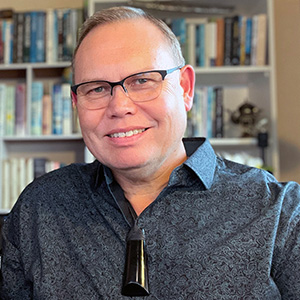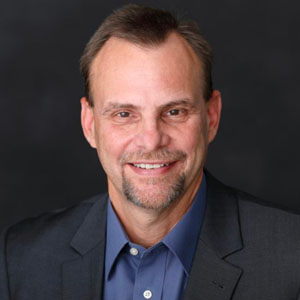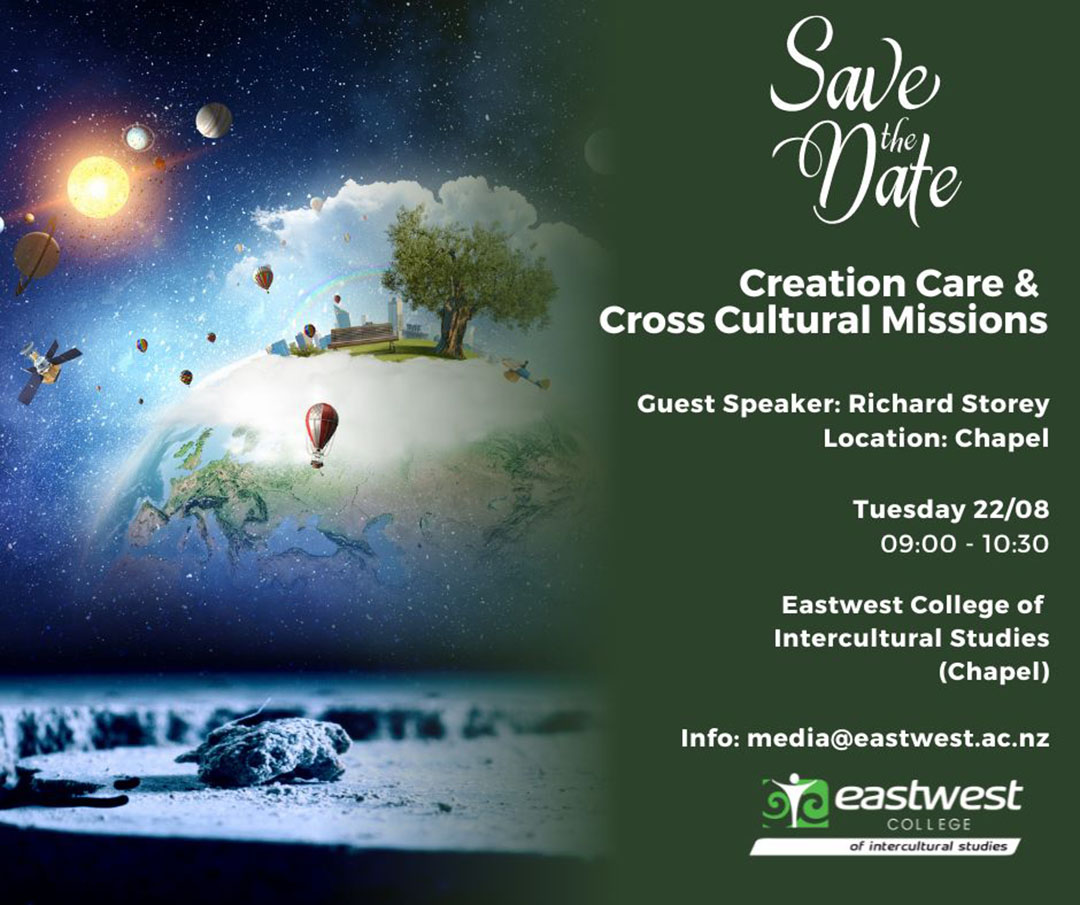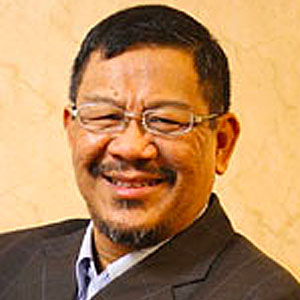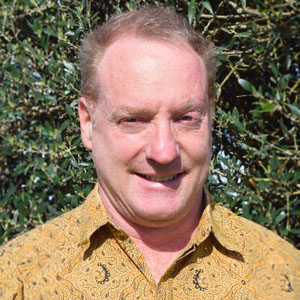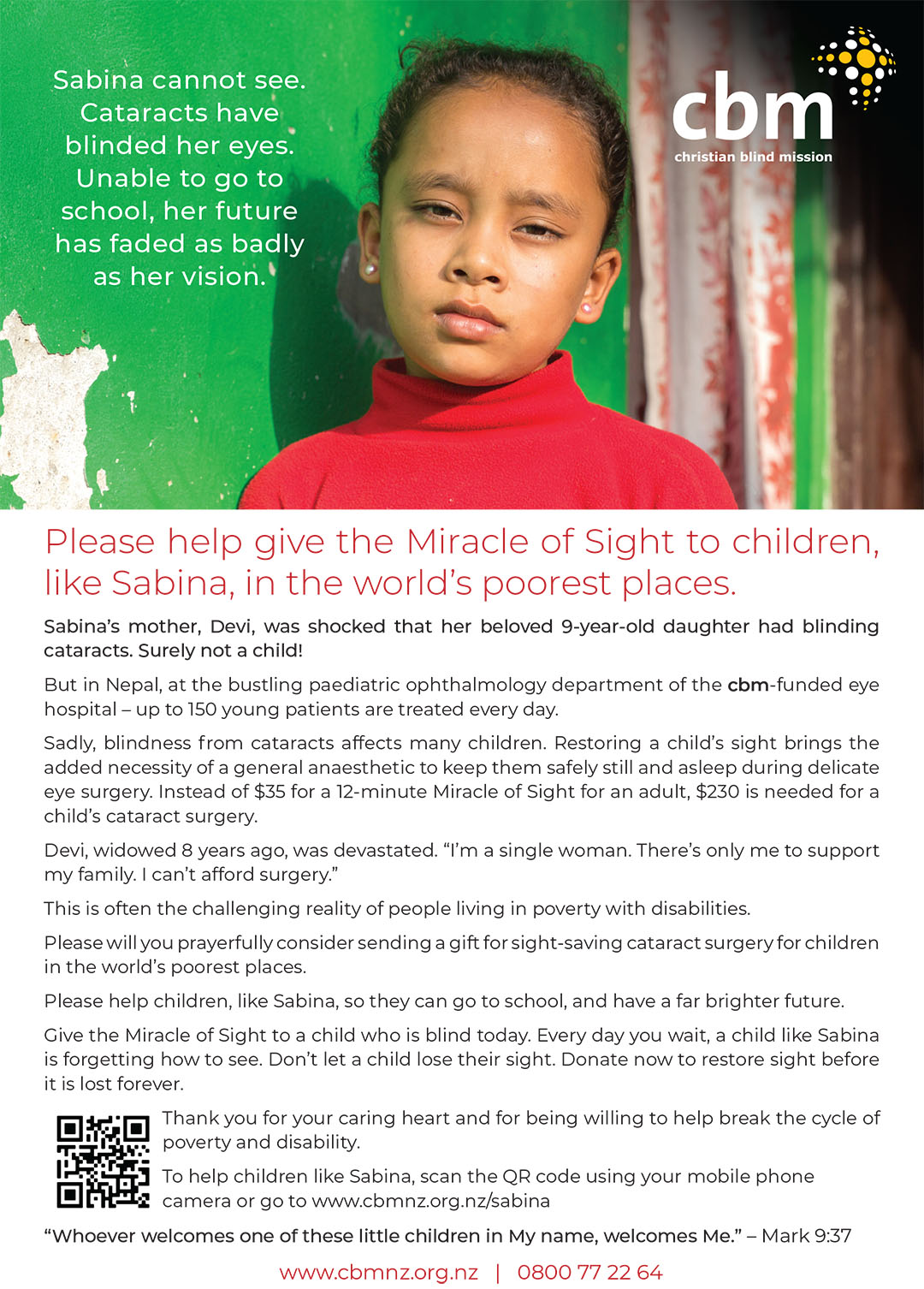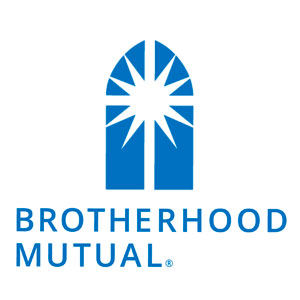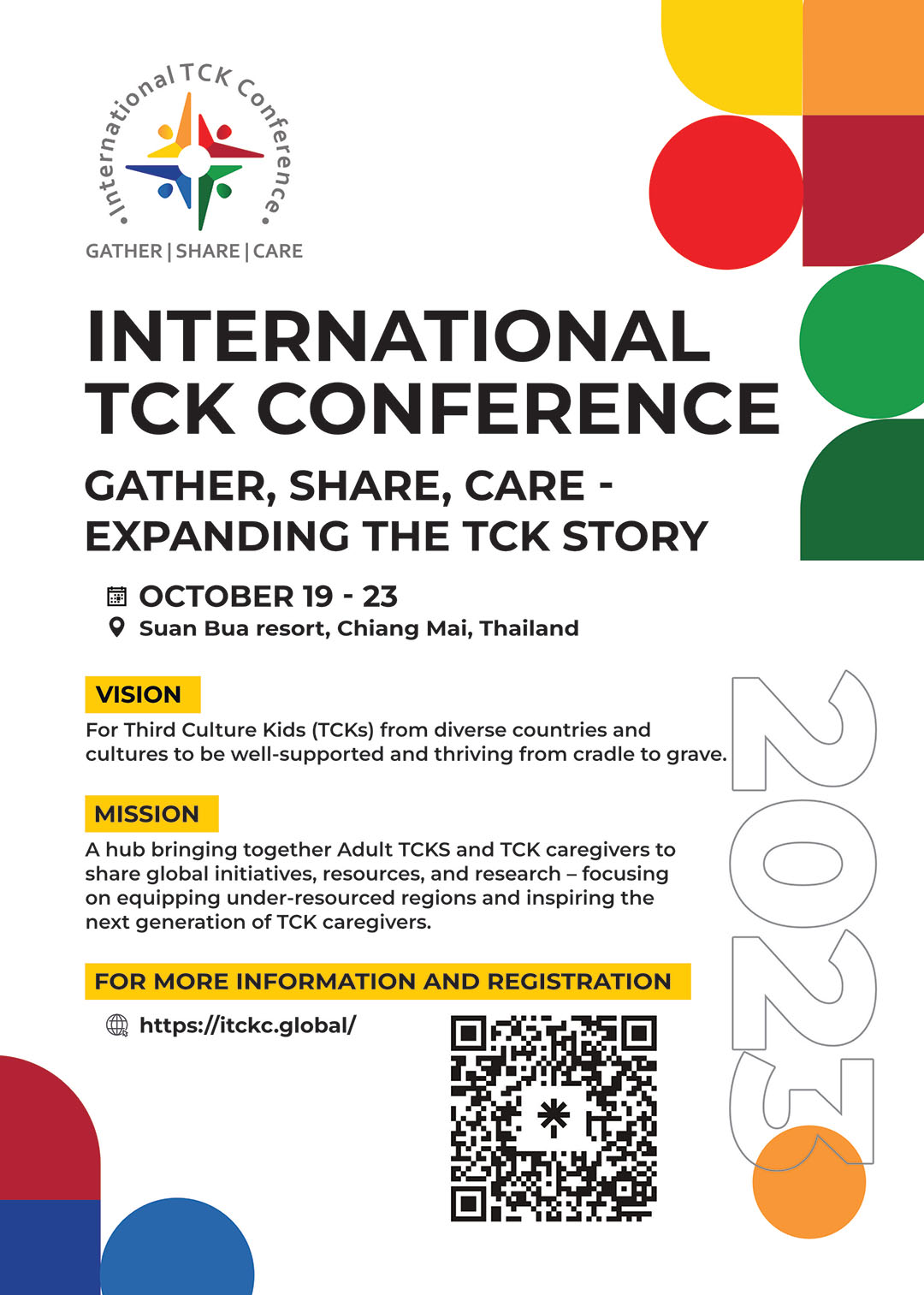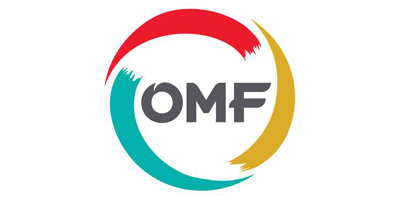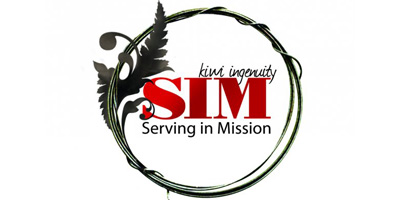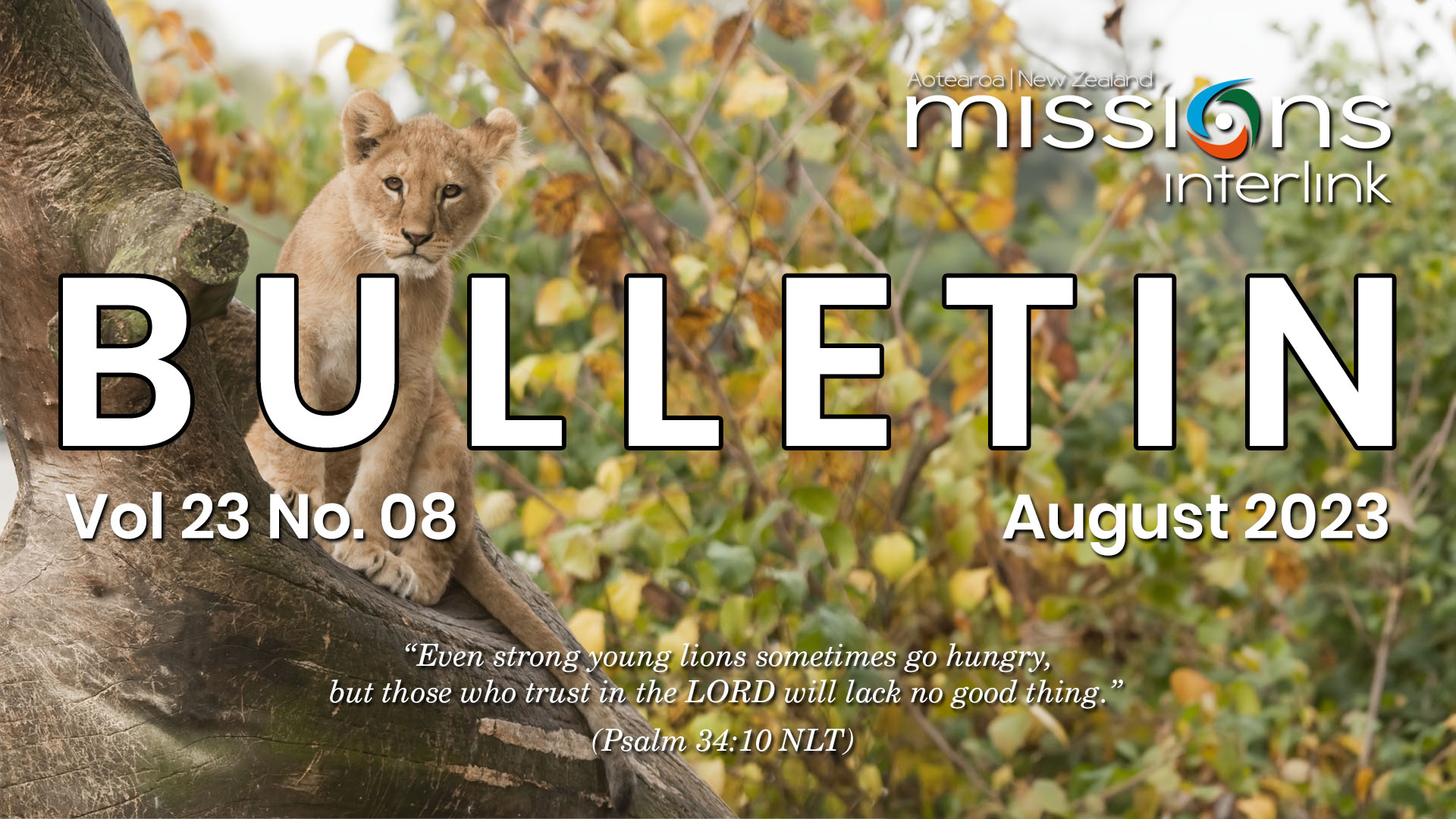
QUICK MENU
EDITORIAL
- Tidal Adaptations
EQUIP
- 5 Factors Affecting Missions
- Korean Changes
GO
- Changed
- Ministry To Seniors
- Retaining Young Adults
- Volunteers
- Miracle of Sight
CARE
- Virtual Victims
PRAY
- FEBC, MINZ, OMF, SIM, WEC, WBT
SPOTS
- Latest News. Events & Opportunities

EDITORIAL
TIDAL ADAPTATIONS
By Dr Jay Matenga
Jay is the Executive Officer of Missions Interlink, Director of Global Witness for the World Evangelical Alliance, and Executive Director of WEA’s Mission Commission. Jay writes and speaks on missions related subjects globally. His blogs, articles, and other public contributions are made available for free on jaymatenga.com
This month’s whakataukī (proverb) is, “Kua huri te tai o kūare, koia ka mimiti noa.” [The tide has turned, and now ebbs away]. The meaning here should be obvious: change has come, there is no turning back. Trying to stem the tide is a pointless, fruitless exercise—there may be no fish to be gained from the shore, but there is food; it just requires a different approach to find it, prepare it, and… to get used to the different taste and texture. It requires change, and change is plain hard work.
Adapting to change is a learning process. It requires a willingness to forego long held assumptions and responses, and submit to the implications of the new information we are now confronted with. In the midst of a prolonged season of shifts, such as we are experiencing in this first half of the twenty-first century, such a willingness can be tapped out. There are too few emotional reserves to invest in the work required to adapt. It can be too hard. It is much easier to insist on holding on to our current knowledge, our long-held way of doing things. Trouble is, they are no longer fit for purpose and it can do more harm than good to hold fast. Our current context is an amplified version of the situation Spencer Johnson wrote about in “Who Moved My Cheese“. We can too easily be the allegorical mouse refusing to budge from the place our food used to be rather than searching out new stores of abundance.
Our nourishment, and the other resources we need to cope with a changed tide will not be found by holding on to the past. Back in 1970 Alvin Toffler recognised this when he noted in his book Future Shock (a prescient title if there ever was one),
By instructing students how to learn, unlearn and relearn, a powerful new dimension can be added to education…Tomorrow’s illiterate will not be the man who can’t read; he will be the man who has not learned how to learn. (p414)
New learning in adulthood often requires us to unlearn before we can relearn what we need for the new contexts we find ourselves in. It is hard work because transformation can be a painful process. Transformative development is not something that comes from the precept-upon-precept, line-upon-line, repetitious type of learning (cf. Isaiah 28:10, 13). While standard education of the building blocks kind adds to our knowledge, the catalyst for truly transformative development that matures us in more radical ways (think: metanoia/repentance) is more like rupturing. A ripping down (unlearning) in order to rebuild (relearning) much like how we develop our muscles via weight training, where micro tearing encourages the building of more muscle fibre, strengthening the body part. As the old proverb says, “no pain, no gain”.
And so we stand on the beach watching the tide disappear, longing for the way things used to be. We judge our current circumstance on the basis of prior learning. I see this response in some Christian commentary on current affairs such as Tim Wilson’s concerns shared in a recent Maxim article. He contrasts two determinations by the Teacher’s Disciplinary Tribunal, with the more severe judgment falling against a Christian maths teacher who refused to acknowledge a gender-transitioning person’s new name (and, by implication, identity). What Tim and many Christians seem to be surprised by is just how seriously our society values individual identity. An attack on one’s convictions (by the imposition of another’s convictions, or a judgement based on those convictions) has become morally reprehensible. This is a major shift in our ‘social contract’ and a relatively new challenge to our old ways of doing evangelism and “being a witness”. The tide has turned, but it is not necessarily an obstacle to the gospel. Christ’s eternal message has long outlasted many such changes, and flourished in new ways with every ebb tide. We need to adjust the fact that Christianity has lost its position of privilege in Western society as moral arbiter (or dictator). But in the annals of human history this privilege was an unusual bubble. Our faith thrives best when it is compassionately lived out in stark contrast to the morality of its context, and then engages that context with loving sensitivity to assist with the gospel’s reception.
So too has missions lost its privilege as the spiritual messenger of an empire that is now thoroughly past. Evangelical missionaries may have been a thorn in the side of imperial authorities, but they still enjoyed the privileges that imperial power afforded. Following the rapid decline of European colonialism after World War II, and subsequent post-colonial critiques that have built momentum ever since, the global missions community has been very slow to adapt to the new world that has emerged. In his article replicated below, Ted Esler recognises that change has come and notes 5 significant marker points that will have bearing on missions over the next 10 years. His perspective is somewhat unique to the USA, but I was fascinated that he ranked “mutuality” second in his list. In my opinion he rightly notes that “It may introduce a paradigmatic shift in our overall understanding of missions”, but he remains cautious. His concerns have some validity, but I think they might be a little premature because a full understanding of mutuality for missions has yet to emerge. We are still figuring out how to find and use those tasty morsels in our ebb tide environment. At the moment we are still in the unlearning phase, the place of deconstruction, a time of necessary critical analysis (or as Ted has experienced it, a “negative polemic”). Mutuality will emerge as the result of a period of serious self-reflection in the light of our global pluralistic context and missions will be the stronger for it. It will be a humbler, more sensitive, and more cooperative missiology; but to suggest, as Ted does, that this means a diminished Christology is unwarranted. Mutuality demands respect for all, but this does not imply that salvation is available to all outside of Jesus. There is only one way (John 14:6), but that way is found by invitation rooted in mutual relationship, not by the imposition of doctrines or moral mandates born of a particular context.
In my presentation to the NZ Association of Christian Schools last month I noted the diminishing influence in society being felt by many Christians, mostly of European descent (aka white Pākehā). I said,
…if you come from a well-to-do Pākehā background you will be better positioned than most, genetically and environmentally, to benefit from our current society. This is what we call privilege… at least it is until society shifts, and such a (position) no longer aligns with the socio-economic environment or context, and you start to feel the loss of privilege. We are in one of those destabilising periods right now, and it can feel very threatening. For those conditioned to maximise benefit from the status quo, social change in favour of some marginalised may feel like it’s threatening your very identity, presenting what is known as an ‘existential crisis’. As an anonymous internet commentator has wryly said concerning justice impacting society, “when you are accustomed to privilege, equality feels like oppression”.
For the sake of the mission of God in the shifting tides of our local and global contexts, may we embrace the pain of our unlearning so that we might grow back stronger, relearning Together: On Mission.

FIVE FACTORS AFFECTING MISSIONS
OVER THE NEXT TEN YEARS
By Dr Ted Esler
By Dr Ted Esler, President of Missio Nexus since 2015. Missio Nexus is the association of agencies and churches representing over 30,000 American missions workers worldwide. Previously, Ted worked in the computer industry before becoming a church planter in Sarajevo, Bosnia, during the 1990s. In 2000, Ted became the Canadian director of Pioneers and three years later, moved to Orlando to join Pioneers USA’s leadership team. This article is curated from Ted’s substack, TedQuarters, 13 July 2023.
Below is a list of items that I think will be the primary issues and topics that the global ministry world will be talking about. These are things that will be global in scope and have a very specific global missions impact. Other items could be on this list, and you can add to them in my Substack post if you want (my first list was long, so I have cut it down to five items). I am specifically trying to stay in the arena of ministry issues.
1. Migration and Immigration
Already, the global missions community is consumed with talk of “diaspora” ministry. With people coming and going around the globe this topic has become hot. I do not see this abating any time soon. I think it will accelerate. With the end of globalization looming (see #5) more people will be looking for economic relief and this means more immigration. Is immigration being oversold as a missions activity? Probably not. While it is not a silver bullet, it is here to stay.
Only 3.2% of the world’s population are living in a country other than their birth country. This amounts to about 218 million people (Interactive World Migration Report 2022). That is a small number when compared to the billions around the world. The reason the topic is so ‘sexy’ right now is that it is a possible rejuvenation of the Western church. Even though immigration is a global phenomenon, the Western missionary movement is enamored with it. This is a paradox. After all the talk about the shifting center of global Christianity, the focus now is being aimed back at the West via immigrant ministry.
2. Mutuality
Mark this word: mutuality. In the halls and conference centers I frequent, this is the term being used to describe the hope of a future generation of missionaries. I believe that much of the racial discussion in the (USA) Church will be aimed back at this concept of mutuality. Mutuality refers to empathetic cross-cultural ministry. It starts with a recognition of the value of the lost and seeks to understand and serve via two-way avenues. It denounces the power associated with colonialism and one-way models of “sending/receiving” (in this way, migration ministry fits perfectly and is one reason why this next generation likes it).
Mutuality is appealing to post-modern culture. It seeks to capture the essence of Jesus’ teaching on weakness. It may introduce a paradigmatic shift in our overall understanding of missions. It is weak on the theology of Jesus’ exclusivity. The current use of mutuality grows mostly out of deconstruction, a critique of past models of mission. If it can be unmoored from its current negative polemic, it will significantly impact a younger generation of missions activists.
3. Declining Population
There is no getting around it. Global population decline will have significant impacts on our world. Entire towns and villages in Eastern Europe are already in massive decline. People are fleeing these places for more populated areas. In the next fifty years, China will undergo population implosion at a rate never seen. Who takes care of the older people when there are few younger people in the workforce? When our entire economic system is built on growth, what happens to our future? Africa will buck this trend and some nations will grow rapidly. How many of these new citizens will seek the empty apartments and sparse economic opportunities of Europe? North America will be the most stable region in terms of population size and age distribution. Will the rich get richer?
Because these are uncharted waters, nobody has a great handle on how to best struggle through the next century. Over the next decade, there is a window of opportunity for nations to prepare. Japan stands as an example that others might take up. They have done more to prepare for their current population decline than any other country. I expect that our leaders will struggle to think long-term about how to best adapt to this new reality. The church will be called on to serve in very unexpected ways.
4. The End of Globalization
It might be unpopular to say in some circles, but the global economic system controlled by the United States is unraveling. Right now, this feels slow, but soon it will feel fast. As I write this, the BRICS nations (Brazil, Russia, India, China, South Africa) are seeking to establish a new monetary order to decouple themselves from the dollar. The impact of “de-Globalization” on China is already being felt as dozens of major industries re-shore and onshore their own manufacturing to home countries. With economic prosperity in Asia on the line, the next ten years are the first years of a new era in global systems of exchange. The rise of the Asian middle class is directly tied to Globalization and this engine is slowing. While Africa will be ripe to displace China as a source of cheap labor, the African infrastructure is weak. Wealthy countries of the West have less appetite to do international business.
What does ministry look like with less international access? How does the African missionary movement spread its wings in an era of increasing protectionism? Will the Chinese missions movement be able to utilize the “Belt and Road” system, built for the Chinese government’s purposes, as a means to spread the gospel? There are many different possible outcomes but the freedoms we have had during the era of Globalization are receding. The first sign of this was the recent (from 2018) expulsion of missionaries from China, but this was only the first of what is to come.
5. US Church Implosion
The US church has been largely exempted from the mass secularization seen in Europe over the past century. This is now reversing with the growth of the “nones” and the inability of the Evangelical church to pass its faith on to the sons and daughters of the current generation. The spillover of political divisions within the culture has forced irrelevancy, with Evangelicals mostly siding with the political right. At the same time, aggressive sexual and gender dysphoria has become the staple of the left, making alternative political options bleak. Evangelical leadership has been mostly made up of Baby Boomers and they are exiting. In their place, we have no obvious leaders who can step in and take up this mantle. The non-Western missionary movement’s largest funder is the US. What happens when this funding goes away?
Does missions live downstream from the Church? If so, we are in for a rough ride. Or, alternatively, will the Church find her calling once again via the global missions movement? Some predict that the future US Church will find its greatest strength in immigrant churches. If so, we are woefully behind in seeing this vision come to fruition.
These are topics that I think will be among the most discussed among missiologists over the next decade. Scary? No. The church will survive these challenges as it has many others over the past two thousand years. We should be careful, though, to avoid triumphalism. There may be some difficult roads to walk. These challenges will require innovation and there are precious few ministries that have successfully transitioned their primary paradigm to something new. Most of us are riding the same horse we rode in on.
How about you? Would these topics be on your list as well? Feel free to comment on my substack. If you like what you read, please subscribe.

KOREAN CHANGES
CALL FOR A BROADER HOLISTIC MISSIONS VISION
By Dr Sam Cho
Sam is the director of Interserve Korea. He worked as a project coordinator for the establishment of the Pyongyang University of Science and Technology. He is also a Business as Mission (BAM) ambassador in South Korea for BAM Global and the Lausanne BAM Network. He holds a PhD in management and an MDiv as his educational background. He currently lives in Sungnam, South Korea, with his wife, Soo. This article is replicated with permission from the Lausanne Global Analysis blog July 2023.
Changes in missions contexts have grown over the years with increasing nationalism, difficult visa situations, and an influx of migrants to Korea. Symptoms of change and confusion in missions were present long before the COVID era. The most palpable blow was a systemic eviction of Korean missionaries from a restrictive access country in 2017 and 2018. The number of Korean missionaries in that country was once more than 4,000 and has dropped to less than 40 percent of 4,000, according to the data in 2022.[2]
Another critical change was the decline of Christianity in Korea. The number of Christians in Korea has plateaued for the past two decades since 2000 and has decreased drastically in recent years.[3] The problem is not just with the number. Society’s trust toward Christians is at a record low.[4] Churches that used the heavy leverage of debt with the expectation of member increase now face decreased income with high interest rates. As a result, the church and the infrastructure of missions are now struggling. With the backdrop of these challenges, Mission Korea, the biggest mission mobilization effort for youth, launched a research team of eight experts to uncover the future of missions. The completed report was presented at the 2018 Mission Korea conference.[5]
Research into the Future of Mission
A research project to determine the future of Korean missions was launched at the 30th anniversary of the Mission Korea conference. The project came from a recognition that the purview of missions in Korean missions circles could be limited because of their previous focus on church planting and evangelizing the unreached.
The research team needed a different reference for missions in the survey to include activities beyond evangelism and church planting. Past Lausanne documents were reviewed through a content analysis to list all the possible expressions of missions.[6] The final survey, with 99 items listed as expressions of missions, was sent to 373 mission leaders, and 62.5 percent of them responded.[7] The items were categorized into 12 missions issues, which were then put into six different groups in the order of statistical importance based on the responses:
1st group: ‘Demographic changes in society and the church’ and ‘Revisiting the gospel’
2nd group: ‘Missions with North Korea’ and ‘Missional church movement’
3rd group: ‘Renovation of the church’
4th group: ‘Management of missions agencies’ and ‘Migrants and multicultural ministries in Korea’
5th group: ‘Tentmakers and Business as Mission (BAM)’
6th group: ‘Indigenization of theology in Korea’, ‘IT and social media’, ‘Social issues in the public arena’, and ‘Spiritual gifts and ministries’
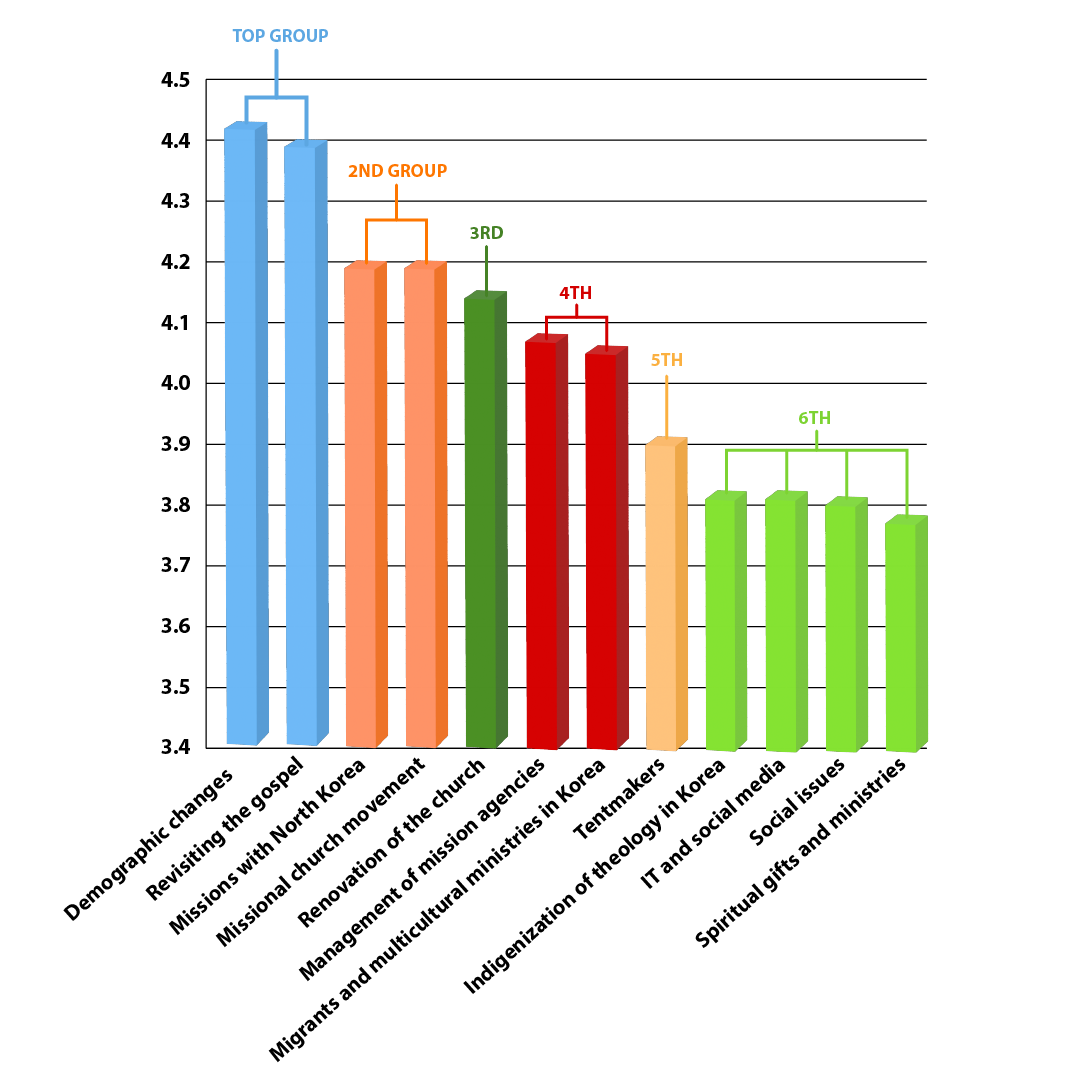
Future issues of Korean mission by their importance.
Different colors indicate statistically significant differences.
The results were quite different from the past focus on unreached peoples. The issue of ‘demographic change’ in the first group can be interpreted as a question: ‘With all the changes in the composition of members of society and the church, where should we go now?’ Another issue of ‘revisiting the gospel’ being in the first group suggests that we should go back to the message of the gospel and start again. The issues from the second to fourth groups do not include anything related to unreached peoples, either. The respondents have indicated that works in North Korea and among immigrants and renovation of the church are needed.
Issues in the fifth and sixth groups were evaluated as being not so highly important compared to the issues in the preceding groups. They are about the roles of individual Christians in society. The research team was puzzled by this result. The content analysis of the Lausanne Movement documents conducted as part of this research showed a trend of global missions towards social participation in the public arena, such as creation care, peace and reconciliation, relieving polarization of society, and assisting social minorities. 32 of the 100 items listed were grouped under ‘social issues in the public arena’.
When all the results were considered together, the leaders in the research sample seemed to say that something had gone wrong, and they tried to find a solution at the institutional level. However, they did not seem to see the diverse roles of individual Christians living in the world. At the end, the team suggested three implications for the future trends of missions for the Korean church:
1) Missions by all: The future players of missions will be ordinary people with different talents and experiences.
2) Missions in the public square: The future venue for missions will be everywhere, in all parts of the society.
3) Integral missions: Witnessing to the gospel will be through personal relationships and by the credibility built over the years in those relationships.
Life As Mission School (LAMS)
Korean churches well remember the Japanese colonial period, when many Western missionaries came into Korea. Unlike other countries under Western colonial powers during that period, Korea did not receive missionaries from its colonizer. This left two legacies in the Korean church.
First, missions is something desirable and even mandatory for Christians. Second, missions is about cross-cultural outreach. Since Korean churches grew to have enough resources for overseas missions in the 1980s, they engaged in missions focusing on unreached peoples and church planting. However, as presented in the research summary above, there is a need to revisit and expand the concept of missions in the present time.
A small group of missions leaders and church pastors have been gathering since 2017 to help local churches and missionaries embrace more diverse ways of participating in God’s mission. Christopher Wright’s book The Mission of God’s People was thought to be a good guide for this purpose, and they started a school using the content of the book to help Christians find their own missions pathway through sharing lives in small groups.[8] The school was called Life As Mission School (LAMS).[9]
The God of mission restoring the world works in and through a person’s life as well. Some find mission in restoring endangered species; some in assisting estranged elderly people in remote villages; some in teaching Korean to Muslim immigrant girls in Itaewon, Seoul; and some in listening attentively to their own children suffering from depression. We have concluded that missions is neither just about ministries overseas nor proprietorship of missionaries. The mission of God is holistic; it embraces both spiritual and physical needs.
The following are a few testimonies of the participants in the school:
‘I always felt confused and guilty in my identity for the last 10 years though I had been active in helping missionaries. It was because I thought I could not become one of them. Now I realized that I was already sent to a medical mission field with young professionals that work with me.’ (Sang Hyup Lee, a medical doctor who runs LAMS for medical workers and young people)
‘I thought church education for missions was only for the ones who went out for short-term missions trips. Now we can help all the members live out missions where they are!’ (Young Suk Yoon, a minister participated in LAMS for pastors)
‘I did not know that evangelicals took the wellbeing of land seriously. I was pleased to find that the Bible teaches us about our connection to the lives around us and gives us the hope of a new earth.’ (Ryoung Kim, an organic strawberry farmer who participated in LAMS as a facilitator).
The LAMS school was expanded over the last five years to different groups and places, such as doctors and nurses, hospitals, businesses, young professionals, missionaries in Muslim nations and other regions, universities, missions organizations, and local churches. The schools are not centrally organized, but they grew into different contexts. Recently, a small group of laypeople even developed a book called Missions of God’s Children, aiming at elementary and middle school kids by adapting Wright’s book. It is going to be published by IVP Korea in the coming months. All this is the rise of a movement.
Mission-eol
The zeal and dedication of Korean churches for cross-cultural missions is a precious heritage to retain. However, changes and challenges in and out of Korea require the church to embrace the diversity of missions. The diversity of missions can be found when God’s works in the life of people and community are reflected and appreciated.
The word ‘mission’ in Korean is pronounced sun gyo. Its literal meaning is to spread a religion. This word carries strong connotation of the nuance of the past ways of missions. So my colleagues and I often intentionally use the word missional without referring to its English meaning. It sounds like ‘mission-eol’, and eol in Korean means the collective spirit of a community. It also carries a notion of something noble. Mission-eol implies that the Holy Spirit of the God of missions is present and working among the followers of Jesus. This is the Spirit we want to plant through the LAM movement. This Spirit once anointed Jesus Christ, and now it awakens people and connects them to be a new wave of missions to reflect the glory of the Lord together, just as prophesied by the prophet Isaiah and proclaimed by Jesus Christ our Lord himself.
ENDNOTES
- ‘2022 Korean Mission Statistics’ (written in Korean), Korea Research Institute for Mission (KRIM), accessed February 14,, 2023, https://krim.org/2022-korean-mission-statistics/.
- Ibid.
- ‘Religions of Koreans 1984–2021 Report’ (written in Korean), Gallup Korea, accessed February 10, 2023, http://www.gallup.co.kr/gallupdb/reportContent.asp?seqNo=1208.
- ‘2023 Social Credibility in the Korean Church Report’ (written in Korean), Christian Ethic Movement, accessed February 13, 2023, https://cemk.org/resource/29349/. This research was conducted by Christian Ethic Movement every year since 2008. Christian Ethic Movement is a well-respected network and movement of Protestant Christians since 1987. The survey was collected in April 2022. The result shows that only 21% of Koreans trust the church; that means four out of five Koreans do not trust Korean churches.
- ‘Future Issues of Korea Mission’ (written in Korean), Mission Korea, http://missionkorea.org.
- This initial work that I did was extended to a research team for better reliability. All the LOPs were read through peered content analysis. When the frequencies of words in LOPs are compared by years of publications, the mission focus of Lausanne Movement seems to have changed over the years from being more cross-cultural and religious issues to being more social and public issues. Its results and implications are in the process of being written for publication in both English and Korean.
- The initial list was presented to and discussed in a focused group of 40 mission leaders to produce 99 items. The following online survey asked respondents of a bigger sample to mark on a Likert scale the degree of importance of each item in light of the future of mission.
- Christopher J. H. Wright, The Mission of God’s People: A Biblical Theology of the Church’s Mission (Grand Rapids, MI: Zondervan, 2010).
- The initial group who coined the term ‘Life As Mission’ and started the school in 2017 has just recently formed an official entity called LAMS in December 2022.
- The LAMS team came from all different backgrounds, such as missionaries from GBT, Interserve, and WEC; staff members from Mission Korea; a businesswoman; and two local church pastors.
BY ANDY MCCULLOUGH
Andy McCullough was born and raised in Cyprus and lived in Turkey from 2009-2016. He has a Master’s Degree in Contextual Theology with Mission from All Nations Christian College, and currently works as Teaching Pastor for Reading Family Church in the UK. He is the author of ‘Global Humility: Attitudes for Mission‘ and ‘The Bethlehem Story‘. He is passionate about cross-cultural church planting, and is involved in coaching and developing churches and leaders, mostly in the Eastern Mediterranean/West Asia region. This article is curated from the Unreached Network’s blog series “Called?”, 3 May 2023.
But it displeased Jonah exceedingly, and he was angry…
And the LORD said, “Do you do well to be angry?” (Jonah 4:1, 4)
When we enter a new culture, we expect to be changed. For the better. The little book of Jonah is the classic picture of cross-cultural mission in the Old Testament. Jonah exhibits a whole catalogue of shortcomings, many of which are in his attitude towards the Ninevites. Jonah’s story is Israel’s story, is the Church’s story, is our story. Many missionaries over the years have found they have identified deeply with Jonah. Is the book of Jonah about God saving Nineveh through Jonah, or about God saving Jonah through Nineveh?
Chang-ee before Chang-er
Veteran missionary James Frazer, when asked eagerly by a student, ‘What was your biggest surprise when you went to China?’ replied, ‘Myself ’.
I wonder if Jonah would have answered similarly.
Freya Stark wrote:
The proper traveller… thinks it a waste to move from his own home if nothing happens inside him as a result. I mean something fundamental, like a chemical change when two substances come into contact.
Humility is reading Scripture and identifying with its weak characters. If Jonah had such gaping flaws in his attitude to the Ninevites, the chances are we do too. Jonah does not have much to teach us about strategy, but a whole load to teach us about our hearts.
Every cultural boundary is an opportunity to be changed. Whenever we come face to face with difference, we have a chance to learn from it. When you are entering a new culture, you are the minority, you are the guest, you are the ‘weird’ one, and this is a unique moment to learn some new perspectives, some new habits, and some new ways of living.
Guest before Host
Part of mission must be to confront sin, but this is best done after taking time to enter. For your first few years in a new place you bite your tongue, you refuse to judge, you choose, instead of saying ‘that is wrong’ to say, ‘that is… different!’ As a guest, you do not have the right to judge your host. Until I have entered, and understood, and belonged, who am I to judge or comment or correct? If you came into my house and insulted my cooking, I would be angry! But if we were friends of many years, then I might listen to your advice or comments on how to cook better.
Anthony Gittins, picking up the language of ‘host’ and ‘guest’, asks:
Do we show adequate and genuine deference to our hosts? Do we willingly acknowledge their authority in the situation, and their rights and duties as hosts? Do we allow ourselves to be adequately positioned as strangers, according to the legitimate needs of the hosts? Or do we try to seize initiatives, show them clearly what our expectations are, make demands on them, and thus effectively refuse the role of stranger, thereby impeding them from being adequate hosts?
Bernard Adeney, on this issue, comments:
Strangers have no inherent right to credibility or trust. These must be earned. Legitimation is a gift from the host … One of the worst things a guest can do is to take away the rights of a host to be the host.
Some foreigners seem to always be on the outside, are always treated with suspicion, and may never earn the right to challenge. Others seem to gain acceptance or legitimisation by their local friends. This has always been true. Early colonial settlers used to accuse some of ‘going native’, meaning that they ate or fraternised or lived in a way that overly identified with local people. It is only these who ever gain the relational authority to challenge, with a view to changing, some aspects of cultural sin.
Take the Ethno- out of your Centrism
The book of Jonah challenges Jewish ethno-centrism (centring our own ethnicity) in the Old Testament—that they are the only seat of revelation, that God can’t love or work through anyone else. The sailors repent while Jonah doesn’t. The king of Nineveh has better theology than Jonah. Nineveh repents at the word of the Lord, while Jonah doesn’t.
We are all ethnocentric—“our way is best.” For example, the English think Germans are too serious, Italians are too emotional, but somehow we are just right. We see ourselves as normal and everyone else as outliers.
And because we think like that, we think God thinks the same as us. We foist our preferences and prejudices onto the Almighty.
Ethnocentrism arises from ignorance—we think our way is best because we have never seriously considered the alternatives. Ethnocentrism arises from arrogance—we don’t seriously consider the alternatives because we do not deem them worthy of consideration. Ethnocentrism is a form of racism. It otherises. It discriminates. It prefers. It is unable to discern that the “other” might be able to teach us something which we need to learn. Which is why it needs dealing with, confronting, challenging, rebuking, transforming.
This is not a given. It’s not automatic. It’s possible to live cross-culturally and become even more resistant, even more otherising, even more racist, as many expatriate communities are.
Common Grace
We need to recognise that God has been at work in the communities we are visiting,
Kosuke Koyama wrote on Western mission to Asia, “While Jesus Christ, the head of the church, has an appreciative mind, often his historical churches have displayed a non-appreciative or even anti-appreciative mind.” He complains that Western missionaries came and threw out everything from Eastern culture, labelled all traditions demonic, and could not perceive the common grace at work in these societies.
In Jonah, we see God implying that he has been at work in Nineveh, long before Jonah arrived.
“And the LORD said, “You pity the plant, for which you did not labor, nor did you make it grow, which came into being in a night and perished in a night. And should not I pity Nineveh, that great city” (Jonah 4:10-11).
There is a breath-taking implication here—that God cares about this city. That he has laboured for it and made it grow. It’s a pagan city, but God has been at work there through his common grace, defined by John Murray as “every favour of whatever kind or degree, falling short of salvation, which this undeserving and sin-cursed world enjoys at the hand of God.”
Douglas Stuart reflects on this phenomenon in Jonah:
The book does not suggest universalism, that all peoples or nations are chosen, but does teach that non-believing peoples may still benefit in some ways from God’s compassion. In this regard the book teaches the biblical doctrine of common grace (i.e. that some of God’s blessings in this life are given to all people in general, not just believers).
God is at work in the world, not just in the Church. Those who cross cultures, encounter new perspectives, enter into new expressions, should do so with appreciation, even awe, knowing that God has been at work long before we got there, expecting to discern God’s grace, even beauty, in the lives of those whom we have gone to ‘instruct’. As Lesslie Newbigin wrote;
We always, with all others, are still in via. We have not arrived. We do not possess the truth. We are learners. And if one thing is made clear in the teaching of Jesus, it is that at the end we shall be surprised.
The great privilege of following Jesus across cultural boundaries is the opportunity to be changed, to learn, to be surprised, to be enriched, to be humbled, to be blessed, to be corrected. This might be the most important aspect of your cross-cultural journey. It certainly has been in mine!

MINISTRY TO SENIORS
A CLOSE ENCOUNTER WITH GRANDMA KWONG
BY DR SADIRI JOY TIRA
Joy (as his friends know him) is Diaspora Missiology Specialist at the Jaffray Centre for Global
Initiatives at Ambrose University, Calgary, Canada, and is the coordinator for the Lausanne North American Diaspora Strategy Group. He is the author of numerous articles and books, including the handbook for global diaspora ministries, “Scattered and Gathered“. This article is curated from Outreach Canada’s blog, August 23 2022.
During the time that I served as Lausanne Catalyst for Diasporas[1], I had the honour of meeting men and women from all corners of the globe and from all walks of life dedicated to the Gospel of Jesus Christ. Truly, I witnessed the Holy Spirit’s moving through the whole Church to take the whole Gospel to the whole World. This moving continues to be awe-inspiring, humbling me to give thanks to the Lord for his faithfulness to the Church that is historically and spatially borderless.
“The whole Church, taking the whole Gospel, to the whole World.” —The Lausanne Movement
Grandma Kwong
In 2019, my last year of service as Lausanne Catalyst, in Toronto, Canada—arguably the world’s most multicultural city[2], I was introduced to an extraordinary woman, “Grandma” Kwong (nee Fan, Wai Lim), born in Guangdon province, China, on July 15, 1908, while the last emperor of China was still on the throne. Her grandson Philip and his wife Amy, young partners of the Lausanne Movement, brought me to her. At 111 years old, Grandma’s mind was clear, her grin was radiant, and in her prayer for Kingdom workers and for myself and my family, her deep and life-long devotion to Jesus and his Kingdom was steadfast. I later learned that, well beyond her centenary year, Grandma continued to partner with the Lausanne Movement in both faithful prayer and in generous financial support. As she held my hands in hers, I was moved by our fellowship in Jesus—it transcended physical, cultural, and linguistic borders, and I was struck by the fact that the Gospel of Jesus Christ had no age borders.
On December 27, 2020, at 112 years old, she left her temporary earthly home for her entrance into the Church Eternal. In celebration of her life, Philip wrote:
Grandma deeply cared about missions, church growth and people believing in Jesus. She loved having visitors—the first thing she wanted to know was if they were believers. She would take the initiative to engage with the young adults (those who could handle some Chinese) and find out how she could pray for them or their families. In essence, Grandma was our young adult ministry partner—she kept her notes on them and would pray for them as a group and as individuals…
Phil recounts Grandma’s last days with them: “True to her being missional, Grandma expressed her missions mindedness in her reminders to us on praying and giving one last time. As always, Grandma never ceased to amaze or inspire us…”
I reflect on Grandma’s life in the context of unique circumstances. In the early Canadian autumn of 2019, when we first met, we could not have expected the “unprecedented” realities that 2020, the upcoming year, would bring. In February and March 2020, the COVID-19 pandemic closed down much of the globe’s geographical borders. Migrants were urged to return to their home countries and people were encouraged to remain in the borders of their own homes. In July 2020, I suffered a severe stroke and for two months my family was told to await long-term prognosis. By the time of Grandma’s home-going in December 2020, I had lived five months within the borders of hospital walls, while the world had experienced nearly three-quarters of the year in isolation, while COVID-19 claimed millions of lives.[3] In Canada, where I live, “deaths caused directly by COVID-19 disproportionately affected the elderly.”[4]
My extended stay in hospital care, with over two months in geriatric units, and then over three months in a hospital unit with primarily senior citizens in care, gave me a new perspective on seniors citizens. Though I am not yet qualified the honourific of “senior citizen,” in their midst I witnessed seniors in missions, and missions to seniors. There were senior citizen patients who prayed for me, for each other, and for the world.
Seniors in Missions & Missions to Seniors
Further, in the midst of the global pandemic, while isolation seemed paramount, there were men and women, often times hospital staff, sometimes regular volunteers, who prayed for seniors as they washed them, fed them, braided their hair, pushed their wheelchairs, brushed their teeth, organised socials, and wiped away tears for them. I cannot count the number of times I observed medical team members encourage seniors to press on, “because, even now, you are loved and because there is always hope.” I even met an octogenarian gentleman—a former patient of the hospital—who after decades of weekends, continued to minister to the hospital patients on Sunday mornings. I asked him why he persisted in old age to lug over his saxophone and devote his Sunday mornings to the hospital and he replied: “Jesus loves me. He saved me. I owe Jesus everything.” Indeed, there are no successful borders to Jesus Christ’s Gospel and Church, not even age.
The United Nations notes:
The global population aged 60 years or over numbered 962 million in 2017, more than twice as large as in 1980 when there were 382 million older persons worldwide. The number of older persons is expected to double again by 2050, when it is projected to reach nearly 2.1 billion.[5]
Grandma Kwong is representative of the many senior citizens—members of the whole Church—who are committed to bringing the whole Gospel to the whole World. As the global pandemic rages on, and even after it has waned, we must remember and support those on the edges of age and those who minister to them. They continue to be Kingdom workers and continue to be a mission field. And they are honoured and loved.
“The whole Church (including the aged), taking the whole Gospel, to the whole World (including the aged)”.
ENDNOTES
- The Diaspora Catalyst was formerly known as Lausanne Senior Associate for Diasporas. Sadiri Joy Tira served in this position from 2007-2019.
- https://torontoglobal.ca/TG-Blog/March-2019/How-multicultural-is-Toronto-Let-us-count-the-way
- At the time of writing, the World Health Organization reports a global death toll of 2,232,233 3 (January 20,2020-February 2, 2021). See “Overview” February 2, 2021 at https:// covid19.who.int.
- https://www150.statcan.gc.ca/n1/daily-quotidien/201126/dq201126c-eng.htm
- Quoted from https://www.un.org/en/development/desa/population/publications/pdf/ageing/ 5 WPA2017_Highlights.pdf. I do not know how the Covid-19 pandemic has adjusted these projections.


RETAINING YOUNG ADULTS
ADDRESSING REASONS TO BELIEVE
BY DAVE MANN
Dave is a creative communicator with a vision to see an understanding of the Christian faith continuing, and also being valued, in the public square in Aotearoa-New Zealand. He has innovated numerous conversational resources for churches, the most well-known of which is the ‘Hope Project’ — a nationwide multimedia project (booklets to most NZ homes, public TV ads, web media) timed for Easter. He is the author of various books and booklets including “Because we care”, “That Leaders might last”, “The Elephant in the Room” and “In One Spirit.” and the producer of various concise Christian equipping, teaching and other video series. All of these resources and more can be found on the All Together NZ website.
With an amount of hands-on involvement in ministry across those years I have some conclusions. This has led to a new initiative—which is free online.
Why do they leave? Beyond the various things stated in the various surveys, noting suggested reasons have differed considerably depending on the questions asked in the initial survey, I see the following key factors in the attrition.
- Some lack a personal experience of God sufficient to convince them their faith and connection to God is true and real.
- Many struggle to find solid reasons to hold onto their faith in the face of (a) the arguments of secular humanism . atheism from Secondary and Tertiary educators and peers, (b) a growing awareness of the other religions, and (c) the challenging perception that Christian morality is itself prejudicial.
- Many lack the Christian support structures needed to stand fast when confronted with the various moral and other temptations of our day. The need for those in rural towns to move to cities for Tertiary study is a big factor.
For church family youth I’d add another: A lack of sincerity in the faith (or even hypocrisy) in the home.
Because the reasons for the attrition are multifaceted, any solution will be likewise. In a broad sense, many reasons are beyond our control. However, addressing a lack of known reasons for believing the faith isn’t beyond our control! It seems to me that we have—as a habit—been underestimating the importance of discussing the reasons that exist for believing this faith to be true in our churches.
As a ‘thought train’, consider that an unanswered question can become a doubt. A doubt can then take root as a new belief. That new belief then undermines two things. Firstly, the conviction a person has in their faith, and secondly, their desire to be a witness. Why give your life to something, or stand for something that you don’t fundamentally believe to be true?
New Zealand has long been considered a very secularised nation and it is my personal belief that we have been underestimating the effect that ’secularisation’ is having on our church members in all age groups. Our Governmental systems, media and education systems are ‘secularised’—which means no religion is privileged, and religion itself is rarely taken seriously. Furthermore, I have tracked a sentiment of mockery toward our Christian faith within public media since the 1980s. By the early 2000s media had stopped involving pastors in public news debates. I believe this is because to include a Christian opinion would send the message that what churches thought would be relevant. Instead, negative stories of churches are told—while overlooking many thousands of positive stories that exist for every negative. It all has an effect!
We Pentecostals like to believe that the Holy Spirit in a person’s life is the key. People need an experience of the Spirit. I agree this is very important. But when it comes to people leaving the faith it’s not the safeguard many would hope. I’ve seen many young people who had profound experiences of God’s love and presence who later walked away from the faith. People can be easily confused. Consider a popular idea that, “Hindus have spiritual experiences too. If all religions are the same, and the Bible no different to a myriad of other spiritual books. You’ve only believed your experience proves your faith because you had it in the context of a church.”
Our work as the Shining Lights Trust is about identifying ‘gaps’ in the outreaching efforts of the Church as a whole in Aotearoa New Zealand—to see innovation addressing those gaps. Having watched this young adult retention gap for a while we’ve now initiated something with a purpose. We have created a resource for use in discussion groups with youth, young adults and adults—and in Christian education in Christian schools. However, this is being done in the hope that a wider discussion could be leveraged out of this experience.
This resource, called ‘Why Christians believe Christianity to be true’, it is a 7 part series including 7 videos (15 minutes long each), 7 booklets and 7 discussion guides. All components are permanently free online—including pdfs of the booklets—via WhyChristiansBelieve.nz. Printed booklets are available via the website also and priced to make their purchase very reasonable as a gift to each of a church’s youth or young adults. Our first hope is to see this being widely used in youth and young adult ministries. Our second hope is then to leverage that process for further discussion.
The truth is, our resource will soon be forgotten. Maybe this resource will have a shelf life of 5 to 10 years. The conversation that is leveraged out of this resource is more important than the resource itself!
If it is indeed true that we would lose less people from our churches (and all be more confident in our witness also) were we to give greater diligence to discussing ’reasons for faith’ in our discipleship with all ages… we need to find habits that will sustain this value. This is because it is habits that build culture.
An article has been written about four habits for church leaders at AllTogether.co.nz/rationalfaith. I think the most simple and powerful of the habits suggested is habit #2. It suggests that a church create a habit of watching four short ‘Faith Q&A videos’ per year, for example during the offering time on four consecutive Sundays every August. The key is in what is said after the 3 to 4 minute video. E.g., “Wasn’t that great! The reason we play a few videos each year is remind us all of this point: Our faith is a rational faith! Answers exist for our questions! So can I please encourage you to ask your questions, talk to others here at church if you can’t find answers—or take a look online, because there are plenty of great videos like the one we just watched. It is important that we know why we believe what we believe, Amen?”
The habit of this encouragement—four weeks in a row—every year, would create culture. The desired culture would be one in which the rationality of our faith is affirmed, so questions people have should be openly asked and discussed… because answers do exist.
Finally, we are wise to leverage what does exist in the ‘reasons for faith’ / apologetics space, to gain momentum from it. I note here Thinking Matters in particular as our nation’s only national apologetics ministry, with conferences held in various places annually. The work they do is important because our young people (and adults) need that knowledge!
We are still losing about two-thirds of our young adults from our churches. Clearly our discipleship isn’t achieving what is needed, to fortify their faiths for the ‘onslaught’ of secularism, scepticism, temptation and peer pressure they face. A higher esteeming of discussion about reasons for faith is likely a key component—and the best strategies are often the simplest ones. Our most important discipleship values need turning into habits, that can build culture!
We pray this area of focus will become stronger in our nation’s churches. We ask all Christian leaders to endorse this point in your own way, to encourage and feed a broad discussion.
For any desiring to use the ‘Why Christians believe Christianity to be true’ resource—it’s free at WhyChristiansBelieve.nz, and accessible from anywhere in the world. It will also soon be found via RightNow Media, for their subscribers internationally.
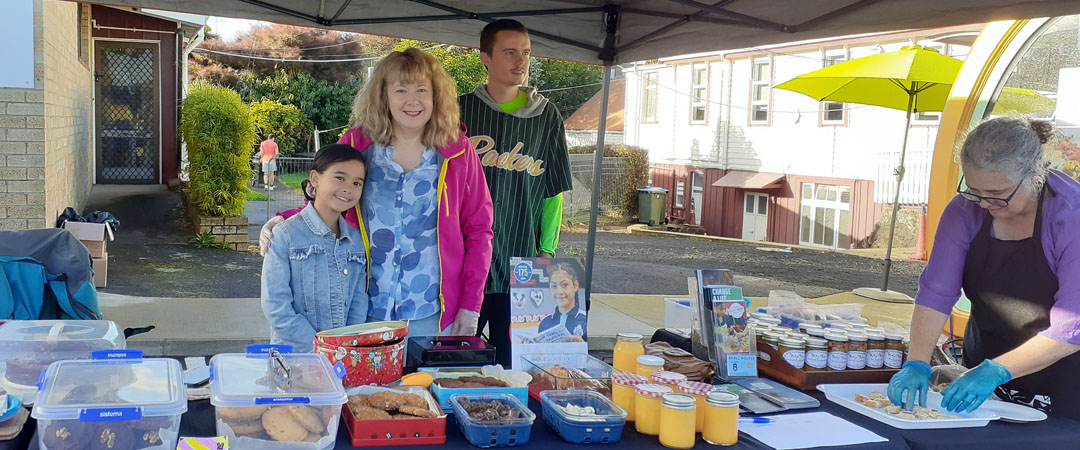
THE NEED FOR VOLUNTEERS
YESTERDAY’S BLESSINGS, TODAY’S CHALLENGES
BY BIBLE SOCIETY NZ
The Bible Society’s mission is to help make the Bible accessible to everyone and to encourage interaction with it.
Through the incredible grace of God and the efforts of hundreds of volunteers, the Bible Society continues in its commitment to the Bible mission. From humble beginnings 177 years ago, influential people like Reverends Samuel Marsden and Walter Lawry were instrumental in promoting the mission of the Bible Society across Aotearoa, New Zealand. After the Auckland Auxiliary was formed in 1846, it wasn’t long before other regions wanted their own Bible Society. A Wellington Auxiliary of the British and Foreign Bible Society was formed two years later, followed by Nelson (1854) and Canterbury (1863). The Otago Bible Society, formed in 1864, was however more strongly affiliated with the Scottish Bible Society. On May 9, 1946, The United Bible Societies fellowship was born. The New Zealand Auxiliary of the British and Foreign Bible Society would join the UBS one year later.
In small towns up and down the country, Bible Society volunteers were known to go “door to door” with their little red books, collecting funds and selling Christmas cards to support the Bible mission. In some places, Bible Society volunteers formed “action groups” to plan and deliver fundraising events three or four times a year. Funds raised from these events went to support local and overseas appeals so Bibles could be translated, printed, and distributed to people groups around the world. There was a strong Christian presence in these communities and a real sense of camaraderie as the body of Christ worked together and were common in their agreement that the Bible was central and core to the Christian faith. Bible Society volunteers were active in demonstrating their faith through their “good works” with fundraising events like Bible Quizzes, Bake Sales, Soup and Savoury luncheons, sponsored walks, car rallies, art auctions, musical concerts, as well as Run or Ride for Bible events. Bible Society volunteers believed in the mission that all people, everywhere, should be able to access a Bible in their heart language, at a price they could afford, and in a format that encourages interaction with it.
Over recent decades, we have witnessed a lot of change in our communities. Immigration policies have created a more culturally diverse population, bringing people with different worldviews, ideologies, and spiritual beliefs to our country. We have also seen our society become increasingly secular, selfish, and hedonistic. Many are solely concerned about their own needs and not the least concerned about caring for those who are hungry, destitute, and alone. We know that God has called us for such a time as this—to reach our generation with the hope and healing message that is found in God’s Word! We need to find fresh ways of connecting with our culture and this requires new formats and ways of presenting the truth like sign language Visual Bibles to connect with those with hearing difficulties, new translations of the Bible to appeal to younger audiences, and even audio Bibles for the illiterate so they can listen to the Bible. It is imperative that the Bible remains at the heart of Christian life and service, so we need to be advocates to help make it available to all people, everywhere! We have been given the responsibility to advocate for the Bible and to share its life-changing, transformative message!
Today, the need for new volunteers is crucial so that the Bible mission can be completed. There are still 1,200 languages projects that need to be translated. Please help! Would you be able to contribute financially to support a Bible translator to finish a Scripture portion? We must work together to support this task of raising funds, while it is still light, so no-one is lost to a Christless eternity because they had not received a Bible.
As a nation, our “free” or “family time” seems to have disappeared with people working longer hours, spending more time in traffic, and caring for others. Some seniors who previously may have had more time to do voluntary work, are now care givers for their grandchildren or fulfilling other important roles. However, others of us may simply need to reprioritise how we use our time, to be available for other things God may want us involved in. Could you become an advocate for the Bible in your family and community, by organising or supporting a fundraiser?
Take a moment to prayerfully consider how you may be able to partner with Bible Society New Zealand to achieve the Bible mission, so all people have access to a Bible. What part can you play to help those who are less fortunate than yourself? Volunteer today and become an agent of hope!
To find out more about how you can be involved as a volunteer for Bible Society New Zealand, have a chat with Sonia Munro on 027 5882876.
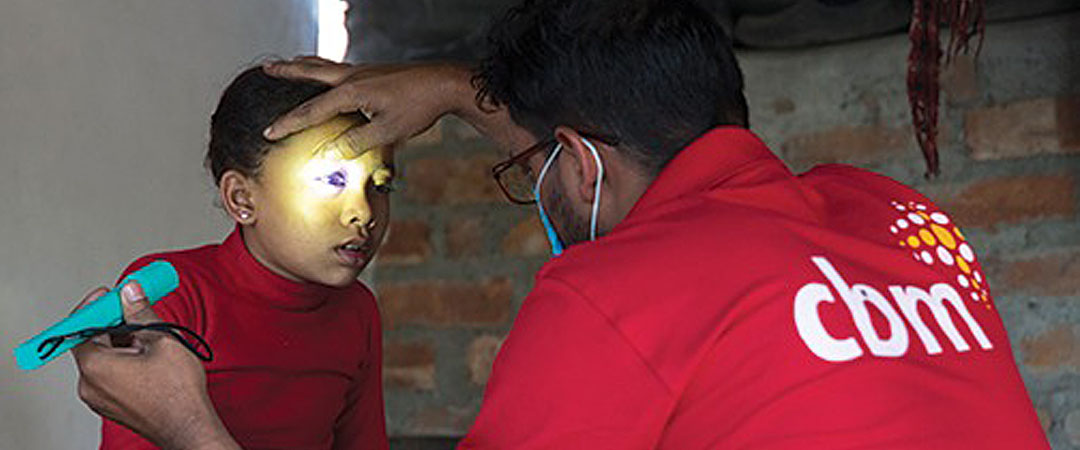
THE MIRACLE OF SIGHT
MINISTRY IN THE WORLD’S POOREST PLACES
BY DR MURRAY SHEARD
Murray received his PhD in Ethics and Philosophy from the University of Auckland. He has worked in international development for over 15 years and is the Chief Executive Officer of cbm New Zealand.
Taking the child in his arms, He said to them, “Whoever welcomes one of these little children
in My name, welcomes Me.” —Jesus, in Mark 9:36-37
Within six months Sabina became almost completely blind because of cataracts. Her impoverished community, fearful of disabilities, shunned the little girl. Her school was unable to help her, so not wanting to give up, she tried to study at home. “I can’t see properly, I can’t help my mother.” Sabina grieves. “My exams are coming. I am worried I will miss them. I miss my school. I can’t see my mother’s face.”
To help deliver vital support for people with disabilities, cbm-funded field workers trek the mountains, identifying adults and children with physical disabilities living in remote areas, and connecting them to relevant services. These cbm-funded services provide vital life-changing corrective surgery, physiotherapy, and locally made assistive devices.
Sadly, cataract blindness affects many adults and children. And restoring a child’s sight brings the added necessity of a general anaesthetic to keep them safely still and asleep during delicate eye surgery. Instead of $35 for a 12-minute Miracle of Sight for an adult, $230 is needed for a child’s cataract surgery.
At the bustling paediatric ophthalmology department of the cbm-funded eye hospital—where up to 150 young patients are treated every day—Sabina was warmly welcomed.
This sight-saving hospital was established 40 years ago by Dr Albrecht Hennig from cbm, when he opened a 12-bed Eye Care Centre. And from these humble beginnings, the cbm-funded Biratnagar Eye Hospital now carries out a thousand operations a day!
In her little purple surgical gown, Sabina waited anxiously with her mother Devi, for her turn. Up to ten children at a time receive the Miracle of Sight each day. One by one, cbm-funded Ophthalmologist Dr Pawan restores their sight.
The miracle of sight-saving cataract surgery is truly amazing! The eye is so complex, but in the way God has designed it, a simple piece of clear plastic can be slipped in… to provide a lifetime of sight. It truly is miraculous!
Through the generosity of cbm supporters, adults are able to better support themselves and their families, and children are able to run and play with their friends, go to school, and plan for a brighter future.
cbm New Zealand, also known as Christian Blind Mission, is an international Christian development organisation, whose mission includes delivering life-changing medication, support and surgeries to people disadvantaged by poverty and disability. cbm aspires to follow the teachings of Jesus in Luke 10:27 “You shall love the Lord your God with all your heart and with all your soul and with all your strength and with all your mind, and your neighbour as yourself.”
cbm’s main focus is to transform the lives of people with disabilities in the world’s poorest places. It is also committed to supporting people with disabilities by working alongside New Zealand churches and organisations that are involved with—and give support to—people with disabilities.
On 1 August, cbm supported the Auckland Church Network during their Disaster Response Training for Churches. cbm’s Karen Jack spoke on “Disability Inclusion, equal access for everyone”, drawing on disaster management experience in countries where cbm supports people with disabilities.
During the New Zealand Christian Leader’s Congress, 19-21 September, cbm will collaborate with Elevate Christian Disability Trust to reflect on disability inclusion in the church. The topic of the panel discussion will be “A Ramp is a Welcome Mat”.
Following on that theme, cbm is developing a 4-week Bible study reflecting on disability inclusion in the local church. Participants will be able to see the world from the eyes of someone living with a disability. Considering that those eyes may be blinded by cataracts. What are the barriers to inclusion that people with disabilities face? And how we can help to change these? Participants will learn how to respond with empathy to people with disabilities. The aim of the study is to encourage participants and churches in New Zealand to move from exclusion, to inclusion, and then to creating an atmosphere of belonging for people with disabilities. To register for this transformational free resource, please email enquiries@cbmnz.org.nz.
cbm has also created a hope-filled Four Week 2023 Advent Series for churches and home groups. Each week participants will receive suggested scriptures for prayer and reflection; an impact story; a short video about cbm’s ministry to bring Hope, Peace, Joy and Love to vulnerable people living with the disadvantage of poverty and disability; and much more.
For each of the four weeks of Advent, cbm will also provide a weekly PowerPoint presentation, with sermon presentations for Advent, for easy use by your church leaders. Included will be scriptures, suggested sermon notes, prayers, cbm’s stories (with cbm short videos), each connected to the week’s theme of Hope, Peace, Joy, or Love. All of these are available at no cost. To find out more about joining cbm for Advent, please email enquiries@cbmnz.org.nz.
cbm supports the vision that people with disabilities should be given the opportunity to use their gifts to serve the church and the community. That is why cbm tells the stories of hope, when people with disabilities in poor communities are empowered to become valuable contributors in their communities.

DON’T BE A VIRTUAL VICTIM
STAYING SAFE IN AN ARTIFICIAL WORLD
BY BROTHERHOOD MUTUAL
For over 100 years Brotherhood Mutual has provided innovative insurance coverage and risk management resources specifically designed for ministries in the United States. They believe insurance is more than a commercial endeavor. It’s a platform to accomplish their mission: to help America’s churches and related ministries build the Kingdom. This article is curated from Botherhood Mutual’s risk management safety library and also published by Missio Nexus (the US missions alliance).
As your short term missions trip abroad draws near, posts by your organization and participants populate social media. Everyone is excited. One person in particular is reading as many publicly available posts as possible so he can gather just enough personal information to move on his target.
On the fourth day of the trip, the mother of a short term volunteer gets a call from what looks like an overseas phone number. Thinking it might be her son or missions staff, she answers. But it’s neither.* Instead she hears screaming in the background and is told her son has been kidnapped. The caller has personal details about her son and his travel and urgently demands she pay a ransom of $1,000 to ensure his safe return. Using rising panic to his advantage, the caller keeps the mother on the phone and gives instructions to pay electronically immediately. Meanwhile, her son actually is sitting safely in a café with members of the missions team going over plans for the day, no idea that anything is amiss back home.
“This scenario is called virtual kidnapping,” said Brad James, account executive at Brotherhood Mutual. “Although the kidnapped person is never physically taken captive, the extortion threat is real. And it’s hard to know what to do if it happens to you.”
The FBI has issued warnings about these schemes. Criminals use details from mission travelers’ social media posts to convince relatives back home their loved one has been kidnapped. Using urgency and threat of harm, scammers usually demand a small sum, often less than $2,000, to ensure the loved one’s release. By the time victims learn their loved ones are safe, the money is gone. Given the logistics, it could take up to a day to determine that the traveler is okay. “Meanwhile, panicked loved ones are calling the local church or the mission organization, frantically asking for help,” said James.
Don’t Become a Virtual Victim
Virtual kidnapping is one of the emerging threats that mission organizations face. Other scenarios include the caller saying the traveller is in the hospital and needs urgent medical assistance or that the traveller has been arrested or is in jail.
If you’re organizing missions travel, consider sharing the following tips with your team members and their families to raise awareness:
- Be careful about what is posted online about upcoming travel. Use social media privacy tools to keep the information available to just your friend group.
- Check to see if your phone number or email is publicly viewable on your social accounts and make them private.
- Discuss this virtual kidnapping scenario with family members prior to travel.
- Have a prearranged codeword that only the traveler and family members know, so you confirm that your traveler is really in danger.
Some possible indicators of a virtual kidnapping include:
- The call number or info looks off or is coming from an unfamiliar number.
- Callers go to great lengths to create a sense of urgency and keep victims on the phone.
- Callers will demand ransom money only to be wired or sent digitally while you’re on the phone.
The FBI shares some ways to respond if you receive a call from someone demanding a ransom for an alleged kidnap victim:
- While staying on the line with the alleged kidnappers, try to call the alleged kidnap victim from another phone.
- To buy time, repeat the caller’s request and tell them you are writing down the demand, or tell the caller you need additional time to meet their demands.
- Don’t directly challenge or argue with the caller. Keep your voice low and steady.
- Request the alleged kidnapper allow the victim to call you back from his/her cell phone
- Try to slow the situation down. Request to speak to your family member directly. Ask, “How do I know my loved one is okay?”
- Ask questions only the alleged kidnapped traveler would know, such as the codeword or info they have not posted on social media.
- Avoid sharing information about yourself or your family.
- Listen carefully to the voice of the alleged victim if they speak.
- Many smartphones will allow you to text while you’re on the phone. Try to text the alleged victim.
- Don’t agree to pay a ransom digitally, by wire, or in person. Delivering money in person can be dangerous.
If you suspect a real kidnapping is taking place or you believe a ransom demand is a scheme, contact the nearest law enforcement immediately.
Real Protection Matters
“We often hear that people called to do mission work are willing to go wherever a ministry wants to send them regardless of risk,” said James. “And we hear that these same people want to know that the ministry sending them out has plans in place to not only proactively protect them, but to help them if something goes wrong.”
James emphasizes that’s why kidnap and ransom insurance is an important coverage to talk with your agent about before sending people into the mission field. “For example, in the case of a virtual kidnapping, a kidnap and ransom policy could cover a ransom paid to virtual kidnappers, so finances are fully restored.”
Not only that, but the liability coverage protecting the missionary-sending organization is invaluable. “What if a traveller really is kidnapped, and the hostage takers decide to harm that person? Regardless of how hard you tried to negotiate the victim’s release, the family might sue the ministry. Having a kidnap and ransom policy mitigates the potential losses from a situation like that,” explained James.
While every policy is unique, most kidnap and ransom coverage can also provide services if a person goes missing, is detained by law enforcement, or needs to be evacuated for security reasons. Coverage typically includes 24/7 access to crisis response experts to help guide your ministry’s actions in a calm, measured manner. Finally, it’s important to consider whether the policy pays for a victim’s injury, recovery care, and reimburses your organization for ransom payments.
* Additional Note: As of 2023 Generative Artificial Intelligence can help scammers clone a person’s voice from a mere 3 second soundbite and even ‘deep fake’ their image. A hostage demand can therefore be very convincing.

PRAYERLINKS
PRAYER FUEL FOR MISSIONS
Please pray for FEBC staff around the world as many are facing persecution, war, and lack of resources. Think Ukraine, Russia, North Korea, Yemen, Vietnam and others. May the Lord comfort and supply them, and may his comfort overflow from each one of them so they in turn can comfort the listeners, followers, and seekers. 2 Cor. 1:3.
Praise God for a refreshing winter ‘staycation’ over the last two weeks of July. We now focus on the responsibilities ahead for the rest of the year. Pray that August will be a great opportunity for planning and connecting, with numerous meetings and Zoom calls due. Pray for Jay as he travels to Malaysia to serve at a missionary leadership retreat 27 Aug – 4 Sept.
The OMF NZ team is growing, and we are starting to build momentum which is encouraging. Pray for those who attend our upcoming public events: Heart for Asia, and Japan Prayer Network, that God would continue to draw people into his mission. Pray too for the speakers as they prepare—that their passion for their areas of service would lead to interesting and informative presentations.
Please pray for those who continue to pray for mission ventures and our workers through 14 prayer groups scattered around the country, our weekly prayer email and our monthly prayer gathering.
WEC have had a short turn around between candidate orientations this year. Our second intake, starts on July 31st, and runs for twelve weeks. Pray for strength, wisdom and freshness for staff leading their second orientation in quick succession. For the 9 candidates, including several young families, pray for good health, bonding and open hearts during this period.

SPOTLIGHTS
LATEST NOTICES & EVENTS
NZTN ANNUAL QUIZ FUNDER
Be in to win a fantastic prize, meet new people, build community, and help the NZ Turkey Network fundraise at the same time! Come join our online quiz night.
Fri 11 Aug Online from 7:15pm
To register and for more information visit: https://events.humanitix.com/nztn-annual-quiz-fundraiser
www.nztn.org
OMF EXPOSURES
Come and join OMF as we “travel” to East Asia on 12 August—get to know an unreached people group you may never have heard of before, and catch a glimpse of OMF’s work in Cambodia.
Japan Prayer Network: learn about and pray for Japan on 14 August.
In person or online. More details can be found here: https://omf.org/nz/get-involved/events/.
CREATION CARE AT EASTWEST
Eastwest College of Intercultural Studies (Gordonton) invites those interested to a morning exploring the topic of Creation Care and Serving Cross-culturally. Tuesday 22 August.
Speakers: Richard and Liza Storey.
Time: 9:00 – 10:30 (followed by morning tea).
Location: Eastwest College, 21 College Drive, Gordonton, Waikato.
For more information email: media@eastwest.ac.nz.
WYCLIFFE NZ’S 60TH
Wycliffe New Zealand is excited to be celebrating 60 years of God’s faithfulness. As friends or partners of the ministry over the years, you are warmly invited to join in celebration at one of three venues near you:
- Christchurch: 9 September, City Church, 6:30pm-9pm
- Wellington: 16 September, The Street Church, 6:30-9pm
- Auckland – Next Generation Event with Eversmith: 29 September, Mount Albert Baptist Church
- Auckland – Main Event: 30 September, Mount Albert Baptist Church, 6:30pm-9pm
For more information contact: admin@wycliffenz.org.
CHRISTIAN LEADERS’ CONGRESS
New Zealand Christian Network’s National Congress is an excellent opportunity for Christian leaders from many different places, cultures, denominations, types of churches, and Christian organisations to explore together the challenges and opportunities for Christianity in our current New Zealand contexts. It will be a time for stimulus, inspiration, prayer, shared worship, fellowship and networking.
Aukilani Community Church
(former location of Liberty Church)
96 Lansford Crescent
Avondale
AUCKLAND
19—21 September 2023
Registration is now open. For more information visit NZCN’s site: https://nzchristiannetwork.org.nz/congress/
LEAD PASTOR VACANCY
Eden Community Church (CCCNZ) is looking for our next lead pastor. We are an urban church with lots of diversity and eager to grow. We are looking for a Lead Pastor who will assist us to flourish and become the worshipping, welcoming, and impacting church God has called us to be. We seek a person who is qualified and enthusiastic about leading us in faithfulness to the Bible and into fruitful development. For more information email: admin@edencommunitychurch.org
Applications close 24th October 2023.
SOUTH PACIFIC MEMBER CARE NETWORK 2024 CONFERENCE
The SPMC Network conference provides an opportunity for professional development and networking with others, sharing your passion to care for those working in cross cultural situations. The speaker is Tony Horsfall from the UK. Tony has been involved in local church leadership for over 30 years. He regularly travels to Singapore and Malaysia to share the message of grace and intimacy with missionaries and church leaders.
Location:
Pallotti college
80 McNamaras Rd
Westburn, VIC 3799
AUSTRALIA
Dates:
From: 29 April 2024 from 2pm
To: 3 May 2024 after lunch.
For more information including pricing click here to visit the MI Australia event page. Earlybird rates expire 30 November 2023.
GLOBAL MEMBER CARE NETWORK 2024 CONFERENCE
The Global Member Care Network is working on their vision to bring the Global Member Care world together again for their 4th Global Concert, this time in Africa. The significance of this location is to serve African mission movements, while learning from their unique strength in missions and member care. Past experiences have shown that surprising connections and transformative insights happen individually, organizationally, and nationally when member care practitioners gather from various national missions movements all over the world.
Location: Nairobi, Kenya
Dates: 28 Oct – 1 Nov 2024
For more information visit: https://globalmembercare.com/conference-2024/
(SAVE THE DATES)
ABOUT US
Executive Officer Jay Mātenga
Administrator Pauline Wood
Executive Team
Joseph Bateson (Chair), Glenn Carter (Vice Chair), Jon Horne (Treasurer), Russell Thorp (Secretary), and Andrew Marriott.
MI Council
Arotahi (formerly NZBMS), Asian Outreach, Beacon Partnerships (formerly LeaDev-Langham), Church Mobilization Trust, Eastwest College, European Christian Mission, GC3, International Teams, Interserve, Laidlaw College, MAF, MotiVate, NZCMS, OMF, Pioneers, SIM, WEC, World Vision, with individual member: Jon Horne.
Our Purpose
We facilitate collaboration towards participation in mission from and within Aotearoa New Zealand. We nurture the missions community in Aotearoa New Zealand to connect, converse, and conduct mission with the aim of working together: on mission.
Connecting the missions community
from and within Aotearoa NZ
for God’s glory everywhere, always.
MI SERVICES include (but are not limited to):
MI BULLETIN MI Online Member Directory
MI ManaakiApp (for retail discounts & coupons)
MI Research and Resources
MI Conferences, Clusters & Collaborations:
Admin, Mission Leaders, Church Mission, Diaspora,
Member Care, Mission Training, Mobilisation, & more.
HOW TO CONTACT US
PO Box 64 379
Botany 2163
Auckland, New Zealand
+64 9 320 4408
CLICK HERE to drop us a note.
ADVERTISING
The MI BULLETIN is distributed by email every month to around 1000 missions interested people.
Commercial Rates & Sponsorship
Only charity rates are listed here. Commercial ad rates and sponsor benefits are set by negotiation.
Spotlight Notices
Text only (up to 50 words with one web link).
MI members — FREE
Non members — $40 per spotlight
BULLETIN Full Colour Ad Space
Artwork must be supplied (.jpg or .pdf, 300dpi)
Deadline: Last Friday of the month before issue.
COST: MI MEMBERS
First Month
A4 Portrait—$150
A5 Landscape—$110
Successive Months
A4 Portrait—$100
A5 Landscape—$80
Non-members, double the member rate.






